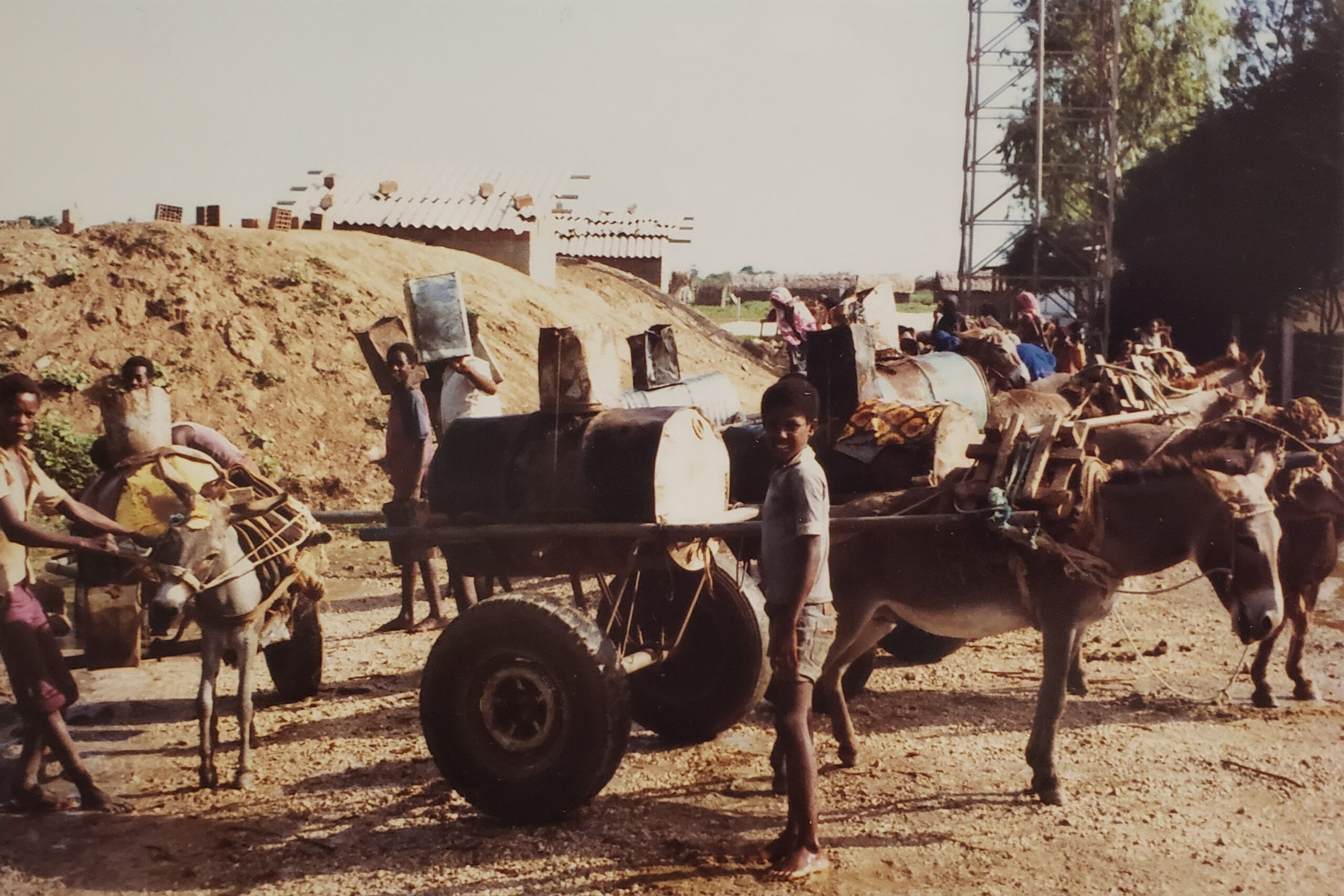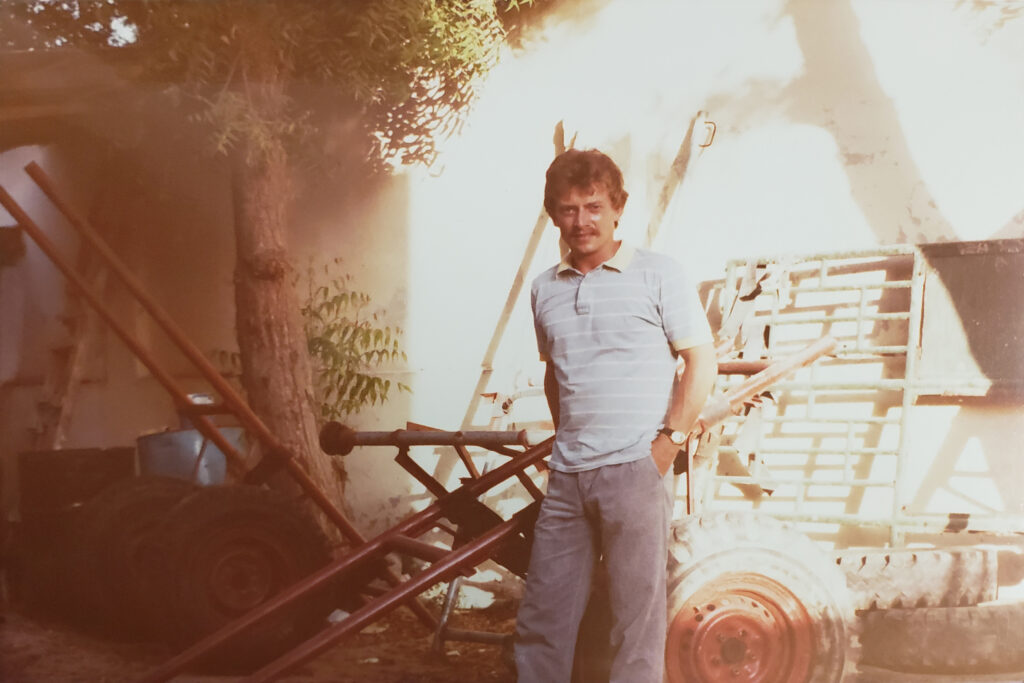Celebrating 35 Years – Gerry Dyck

It was 1982. The end of summer. Gerry Dyck, 24, was working on a grain elevator, finishing up the painting season, when he got a phone call. Art DeFehr, a guest lecturer whom Gerry had met earlier that year at college, was inviting him to Somalia where Art had just been appointed UN high commissioner for refugees. Art’s friend Paul Polak was also going; he wanted to explore economic opportunities for refugees living in the camps. In that moment, Gerry didn’t know two things: 1) how Art found him on the side of a grain elevator and 2) where Somalia was. But he said yes.
Once on the ground in Mogadishu, Gerry quickly wondered what he had gotten himself into. Bouncing along in the jeep, listening to Art and Paul assess the situation in the camps, he realized the complexity of the issues. There were an estimated 400,000 refugees living in huts located in 30 camps along the Shabelle and Jubba rivers. They were victims of war, drought and political turmoil.
“I think it was a bit like take your kid to work day,” Gerry says. “When we began talking to people in the camps, I don’t think I said a word.”
But, as a recent graduate of economics, Gerry considered himself fortunate, a student among two professors.
“They (Paul and Art) were both a bit radical and could be disruptors. They were typically the first to present an idea and they didn’t hesitate just because no one else went along. I got to be there when they were successful and I got to be there when they failed. They took me under wing,” Gerry says.
Undaunted by the complexities of politics and logistics, Paul got down to business. He was there to help refugees make money. A former psychiatrist with a gift for communication, he started by asking those living in the camps what entrepreneurial ideas might work. Based on these interviews, together, he and Gerry explored options: mud bricks for better construction, power generation using windmills, plastic extrusion. All of these proved too big; the Somali government wanted to pursue these ideas themselves.
So Paul and Gerry kept going. They needed a smaller idea, one that could make refugees money and one that could compete with the sale of food rations. Selling food rations grew out of an excess of aid and the ability of refugees to travel between camps to get extra food, for which there was a booming market.
After researching a number of other ideas, in the end, they settled on donkey carts. Carts were already in Somalia but not typically in the camps. The design was inefficient and often harmed the animals. A modified cart could become a means of transportation for people and goods and they could generate enough income to compete with the sale of food rations.

“Officials didn’t think carts were necessary or that they would be successful as a business but it was a small enough idea and one they were willing to consider,” Gerry says.
But final approval for the project would depend on financial support from the UN and the Government of Canada. So, Gerry returned home where he began the incorporation process for International Development Enterprises (iDE) and met with the Canadian International Development Agency (now Global Affairs Canada) to apply for the organization’s first grant.
“At that time, we had no track record, I had no job and I was working for an organization that technically didn’t exist,” says Gerry. “But I could see the potential. At this point, I was really excited. I had a sense of this being a big deal. If we could get entrepreneurs to grab onto business solutions, they could deal with poverty.”
Pressed for time, Gerry called the CIDA officer in charge of the Africa desk. He was booked and Gerry needed to get back to Somalia so he arranged to meet at the officer’s house. “I made my pitch in his living room and somehow convinced him we were legit.”
With CIDA funding secured and working with MEDA’s support, Gerry returned to Mogadishu. But his sense of urgency wasn’t matched by Somali officials. After weeks of foot-dragging, eventually Paul and Gerry staged a sit-in at the Somali government office. Their peaceful protest lasted for two months.
“We alternated days,” Gerry says, “and if we saw the officer in charge, we’d ask him if he had any news. We simply waited them out.”
Finally, with an approved project and funding in hand, they could begin work on donkey cart prototypes and stockpiling materials: drums for hauling water, axles from wrecked cars, parts from military vehicles.
Once they had a working model, they partnered with organizations already in the camps. In turn, these organizations found aspiring entrepreneurs who could purchase the carts on credit and generate income by renting them out. Side businesses such as building and maintaining the carts also flourished. Those who purchased multiple carts could hire drivers. In three years, over five hundred carts were sold, generating almost $1 million of net income for cart owners, almost all of whom had paid back their original loans.
In the end, Somali officials wanted iDE to stay but Paul, Art and Gerry had accomplished what they had set out to. They had created an income generating opportunity for those living in poverty in one of the harshest environments on the planet, then and now. A new opportunity in Bangladesh involving water pumps was already in the works.
“One Somali official told me, ‘no man who sits behind a donkey cart is going to marry my daughter.’ And the same guy told me a couple of years later, ‘the man who owns a donkey cart has so much money he’s welcome to marry my daughter.’”
In 1985, as iDE prepared to leave, they were able to return money they had borrowed from the UN. Income generation projects had never generated income to that level, so UN Somalia had to call Geneva and ask how to take the money back.
“I’m proud of that,” Gerry says. “We had set up entrepreneurs to survive our exit. That was the first time I understood what sustainability really meant. Someone once told me they saw one of our carts in Kenya. And I loved that. They had made enough income to say, ‘I’m outta here.’”
iDE Canada was incorporated on January 7, 1983. The organization was co- founded by Paul Polak, Art DeFehr and Gerry Dyck. As we celebrate our founders and 35 years of helping others, it is always with an eye to the future. How can we help more families with business solutions that will lift them out of poverty? How can we keep challenging convention and innovating like our founders did with their first project in Somalia?
